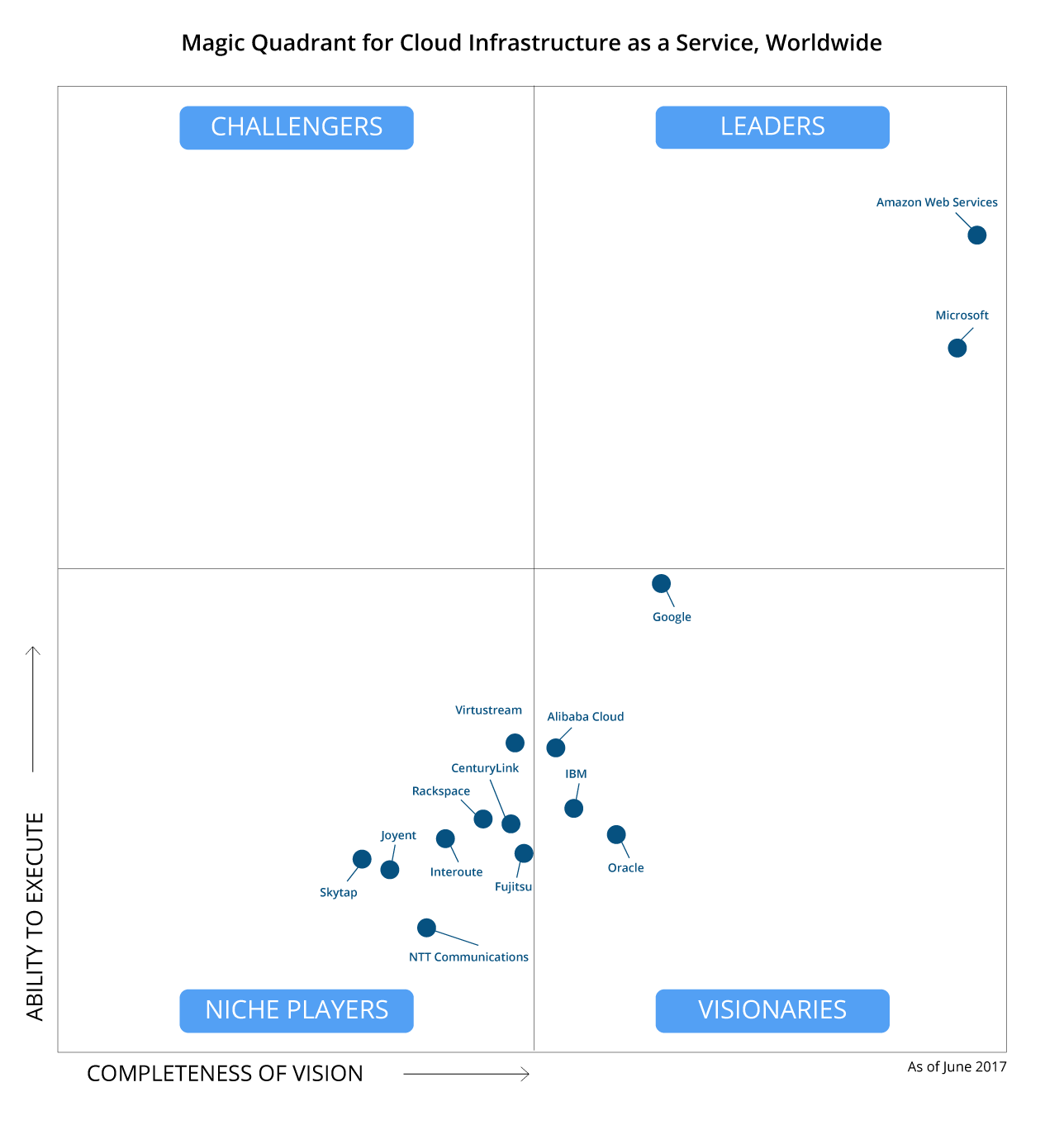AWS Certification Training: PwC Academy
- 172k Enrolled Learners
- Weekend/Weekday
- Live Class
AWS is a global leader among all Cloud Service Platforms. Still, wondering if AWS is for you? Through the medium of this blog, I am going to give you the top 10 reasons to learn AWS and to articulate it in your architecture. You can learn more from the AWS Training and Certification.
Wondering what are the skills, you should master this year?
This blog will focus on the following reasons:
Before I do get started, I would want you to take a look at this report by Gartner which compares leading cloud service providers:

You can even check out the details of Migrating to AWS with the AWS Cloud Migration Certification.
Let us take a look at these reasons one by one:
 AWS provides you with API’s in various programming languages to help you manage your infrastructure programmatically. API’s help you:
AWS provides you with API’s in various programming languages to help you manage your infrastructure programmatically. API’s help you:
API’s help you utilise all of the time-and-cost-saving features AWS. There are third party API’s that serve your purpose well.
Check out the AWS Tutorial to learn some basics today!
 Cloud security has always been a topic of debate. But AWS does that really well. AWS assures utmost level of security for both small and large scale companies.The best thing is Since AWS does this for you, you as a business owner does not have to worry about it. AWS also offers various compliance programs with an extensive security support network which offers real-time insight on suspicious activity and potential vulnerabilities.
Cloud security has always been a topic of debate. But AWS does that really well. AWS assures utmost level of security for both small and large scale companies.The best thing is Since AWS does this for you, you as a business owner does not have to worry about it. AWS also offers various compliance programs with an extensive security support network which offers real-time insight on suspicious activity and potential vulnerabilities.
 For some businesses, even a small amount of downtime or data loss spells disaster. For others, the cost of (limited) downtime/data loss does not outweigh the cost of maintaining a multi-site/Hot Standby recovery method. But whatever your business’s tolerance for downtime/data loss may be, AWS’s versatile platform can provide you with the right tools for your disaster recovery plan.
For some businesses, even a small amount of downtime or data loss spells disaster. For others, the cost of (limited) downtime/data loss does not outweigh the cost of maintaining a multi-site/Hot Standby recovery method. But whatever your business’s tolerance for downtime/data loss may be, AWS’s versatile platform can provide you with the right tools for your disaster recovery plan.
Are you ready to take your skills in AWS to the next level and become an expert in DevOps? Enroll now in our AWS DevOps Certification Course and gain the knowledge and skills needed to design, deploy, and manage robust and scalable AWS infrastructure.
 But the flexibility of AWS doesn’t stop there. The platform also allows for a high level of customization to meet the needs of individual businesses. For example, customer-defined tagging allows users to easily monitor and manage resources. From cost tracking and security to organization and automation, there’s virtually no limit to how or why customizable AWS tags can be utilized.
But the flexibility of AWS doesn’t stop there. The platform also allows for a high level of customization to meet the needs of individual businesses. For example, customer-defined tagging allows users to easily monitor and manage resources. From cost tracking and security to organization and automation, there’s virtually no limit to how or why customizable AWS tags can be utilized.
 Another one of the multiple reasons to choose AWS is the ability to start and stop various instances at predetermined times. For example, the ability to schedule services such as Elastic Compute Cloud (EC2) and Relational Database Service (RDS) means they won’t have to run during off hours or weekends. And with the help of third-party tools such as CloudRanger, there’s no scripting required. Which leads us to our next point.
Another one of the multiple reasons to choose AWS is the ability to start and stop various instances at predetermined times. For example, the ability to schedule services such as Elastic Compute Cloud (EC2) and Relational Database Service (RDS) means they won’t have to run during off hours or weekends. And with the help of third-party tools such as CloudRanger, there’s no scripting required. Which leads us to our next point.
 While AWS is an extremely useful platform for backups and disaster recovery, it is also extremely reliable. Despite a high-profile outage earlier this year, an independent review found that since 2015, AWS has been “far better at keeping its public cloud service running than either Microsoft or Google.” It also found that 40 percent of the platform’s total downtime during the same time period was tied to a single outage.
While AWS is an extremely useful platform for backups and disaster recovery, it is also extremely reliable. Despite a high-profile outage earlier this year, an independent review found that since 2015, AWS has been “far better at keeping its public cloud service running than either Microsoft or Google.” It also found that 40 percent of the platform’s total downtime during the same time period was tied to a single outage.
 As we know AWS is highly scalable. It replicates similar approach in managed services for database, caching, data-warehousing, transcoding, storage, backup, infrastructure management & application management. This helps decrease the overall time & effort spent in setting-up & managing the infrastructure. This helps reduce the overall cost to market.
As we know AWS is highly scalable. It replicates similar approach in managed services for database, caching, data-warehousing, transcoding, storage, backup, infrastructure management & application management. This helps decrease the overall time & effort spent in setting-up & managing the infrastructure. This helps reduce the overall cost to market.
 Location plays a very important role before you decide to pick a location for your servers to reside. AWS is a global leader when we talk about cloud service providers. It uses labels like ‘Regions’ and ‘Availability Zones’ for its Data centres. AWS owns 44 availability zones within 16 geographic regions around the world. Many more availability zones are a work in progress.
Location plays a very important role before you decide to pick a location for your servers to reside. AWS is a global leader when we talk about cloud service providers. It uses labels like ‘Regions’ and ‘Availability Zones’ for its Data centres. AWS owns 44 availability zones within 16 geographic regions around the world. Many more availability zones are a work in progress.
 Now that I have already mentioned scalability let’s discuss that first. Right from initiation Amazon’s focus has been on scalability. This flexibility meant businesses could easily scale up or down to meet the business needs. The same philosphy has been incorporated by AWS which greatly helps the users.This extremely flexible system is now the hallmark of AWS, and is one of the main reasons to choose AWS. Hence on demand scalability and flexibility find their place in the list of top 10 reasons to learn AWS and use it.
Now that I have already mentioned scalability let’s discuss that first. Right from initiation Amazon’s focus has been on scalability. This flexibility meant businesses could easily scale up or down to meet the business needs. The same philosphy has been incorporated by AWS which greatly helps the users.This extremely flexible system is now the hallmark of AWS, and is one of the main reasons to choose AWS. Hence on demand scalability and flexibility find their place in the list of top 10 reasons to learn AWS and use it.
Related Article: Azure vs AWS: Which one is better?
Check out our AWS Certification Training in Top Cities
| India | Other Countries/Cities |
| Hyderabad | Atlanta |
| Bangalore | Canada |
| Chennai | Dubai |
| Mumbai | London |
| Pune | UK |
 This might easily be the most popular of the top 10 reason to learn AWS and also use it. For people who are new and want to learn about the technology, AWS has a free tier available for an access of one year. This is sufficient to get one started. AWS is extremely flexible and offers a pay-as-you-go approach which can greatly help serve your business needs. Flexible pricing greatly supports up-scaling or down-scaling the architecture as per the needs.
This might easily be the most popular of the top 10 reason to learn AWS and also use it. For people who are new and want to learn about the technology, AWS has a free tier available for an access of one year. This is sufficient to get one started. AWS is extremely flexible and offers a pay-as-you-go approach which can greatly help serve your business needs. Flexible pricing greatly supports up-scaling or down-scaling the architecture as per the needs.
This brings us to the end of this blog on Top 10 reasons to learn AWS. We have come up with a curriculum that covers exactly what you would need to crack the Solution Architect Exam! You can have a look at the AWS Master Program to do the masters.
Put all your queries in the comment section, so we can revert to you at the earliest.
| Course Name | Date | Details |
|---|---|---|
| AWS Certification Training: PwC Academy | Class Starts on 31st August,2024 31st August SAT&SUN (Weekend Batch) | View Details |
| AWS Certification Training: PwC Academy | Class Starts on 14th September,2024 14th September SAT&SUN (Weekend Batch) | View Details |
| AWS Certification Training: PwC Academy | Class Starts on 16th September,2024 16th September MON-FRI (Weekday Batch) | View Details |
 REGISTER FOR FREE WEBINAR
REGISTER FOR FREE WEBINAR  Thank you for registering Join Edureka Meetup community for 100+ Free Webinars each month JOIN MEETUP GROUP
Thank you for registering Join Edureka Meetup community for 100+ Free Webinars each month JOIN MEETUP GROUP
edureka.co
